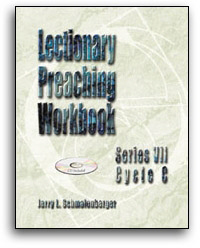SermonStudio
Proper 17
Preaching
Lectionary Preaching Workbook
Series VII Cycle C
Seasonal Theme
Jesus' acts of compassion and teaching ministry.
Theme For The Day
Christian disciple way of life which includes humility, hospitality, and charity.
Old Testament Lesson
Jeremiah 2:4-13
For No Reason Yahweh Deserted
Verse 2:4 is an introduction to the coming section. The question is asked: What did God do to deserve abandonment by the people to pursue worthless things?
Jesus' acts of compassion and teaching ministry.
Theme For The Day
Christian disciple way of life which includes humility, hospitality, and charity.
Old Testament Lesson
Jeremiah 2:4-13
For No Reason Yahweh Deserted
Verse 2:4 is an introduction to the coming section. The question is asked: What did God do to deserve abandonment by the people to pursue worthless things?


